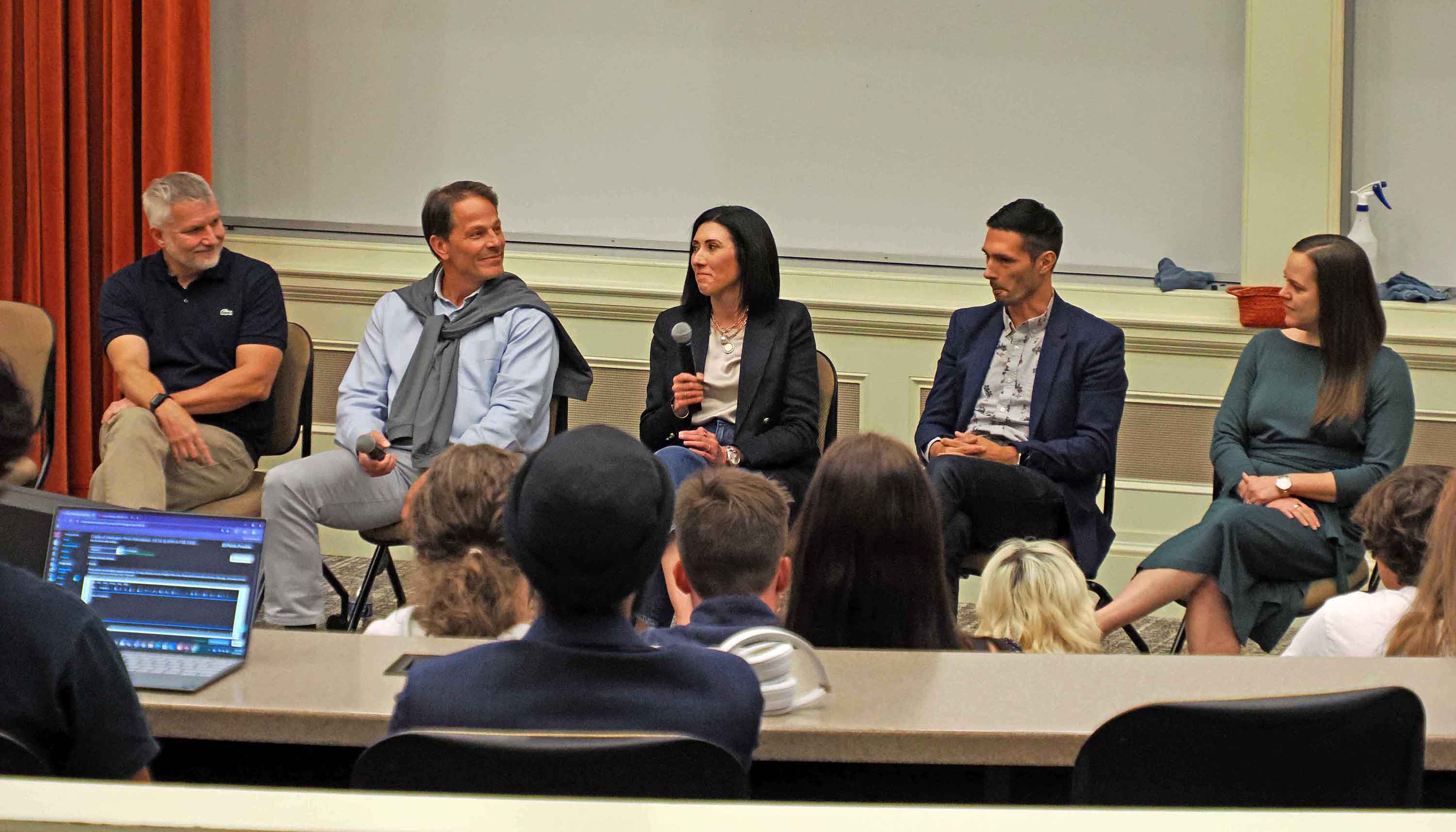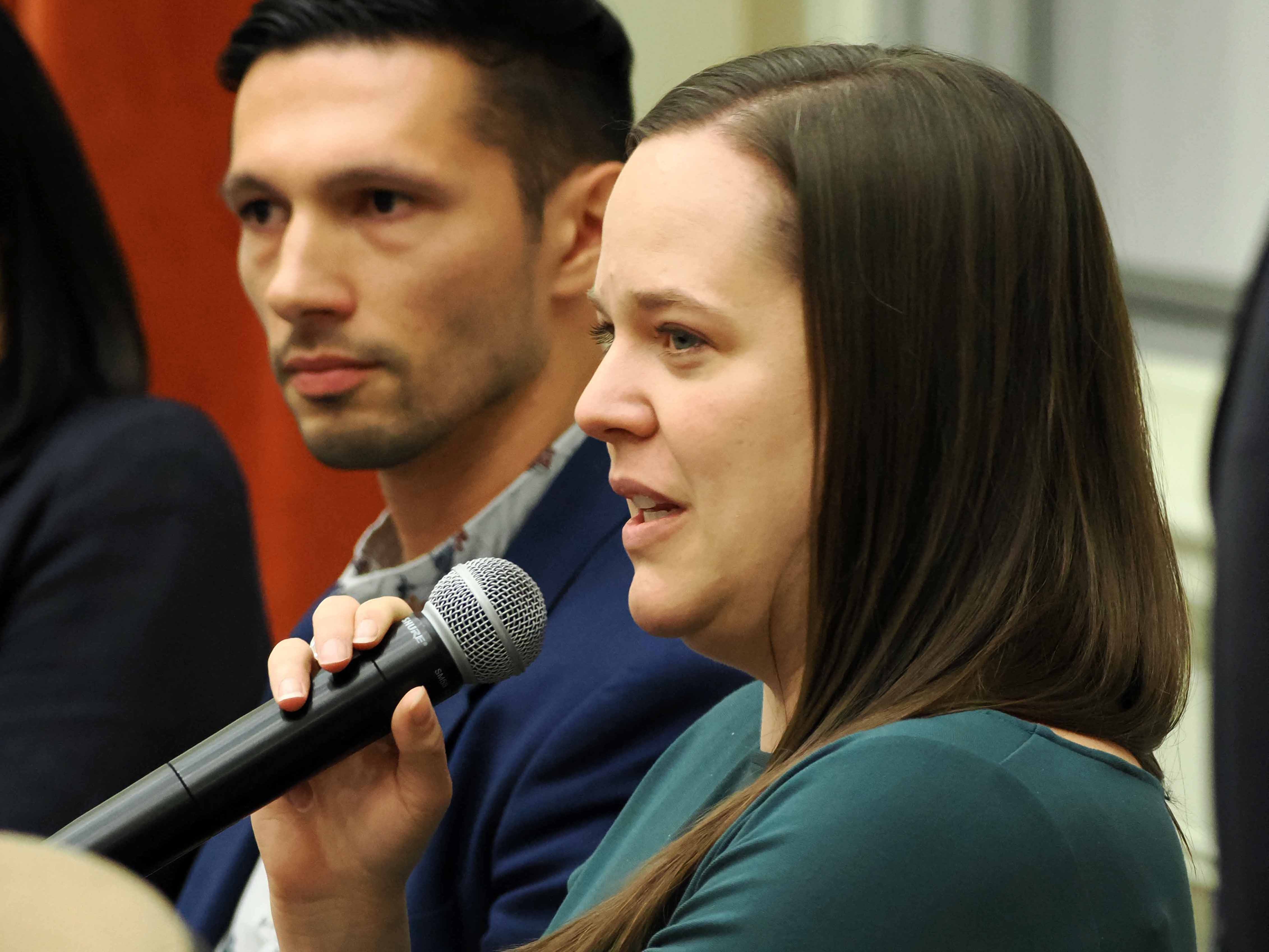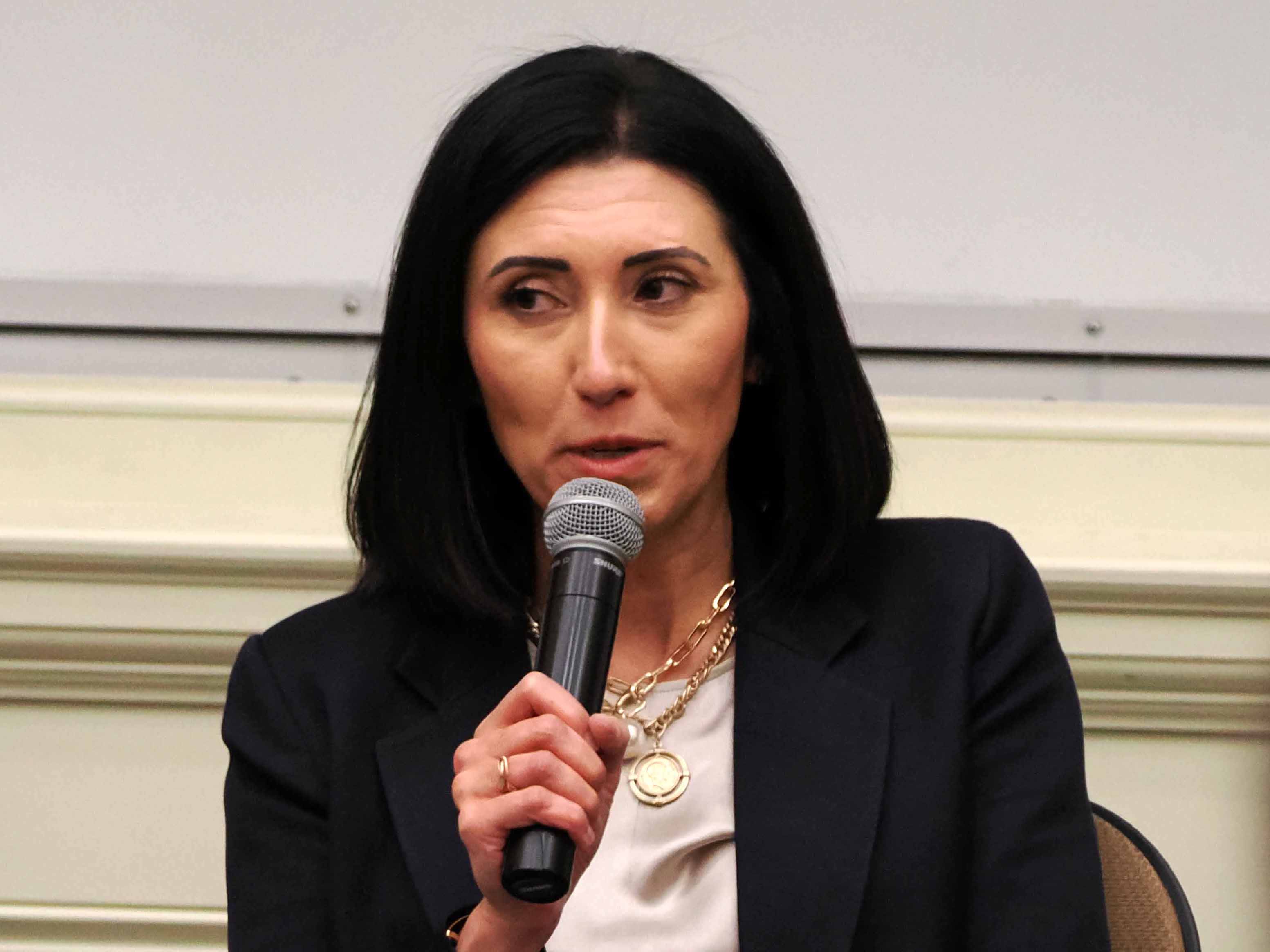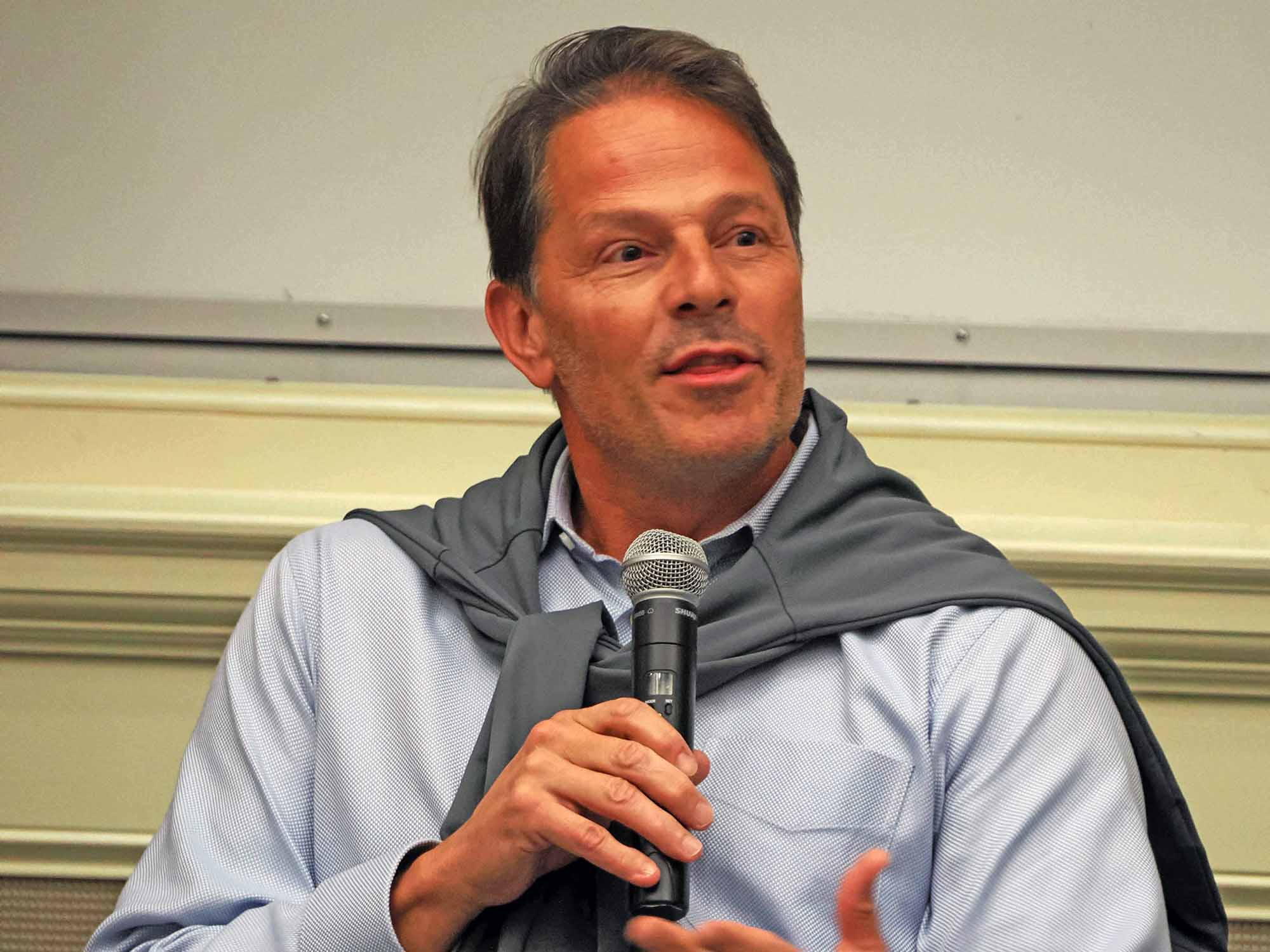Farmer School alumni return to give knowledge, advice to students
Quintet of alumni participate in fall Marketing panel at FSB

Farmer School alumni return to give knowledge, advice to students
One of the great attributes of the Farmer School of Business is the number of alumni who return to Oxford to share their time and knowledge with the next generation of business leaders.
Five of them returned to take part in a marketing panel this month to talk about their current roles and give students some advice on making their way along their own future career paths.
 Katie Denlinger ‘08: Principal at Deloitte Consulting: “I think when we see people that excel in their roles, it's because they're not following a defined script of ‘What did I tell you to do or train you to do,’ but they actually step back from the problem and think about it. You're not going to find the answer in somebody else's deck or in an AI or whatever. You have to actually think about the problem and understand how a company works and how they make money. Being a critical thinker, being willing to put in the thought time to solve a problem.”
Katie Denlinger ‘08: Principal at Deloitte Consulting: “I think when we see people that excel in their roles, it's because they're not following a defined script of ‘What did I tell you to do or train you to do,’ but they actually step back from the problem and think about it. You're not going to find the answer in somebody else's deck or in an AI or whatever. You have to actually think about the problem and understand how a company works and how they make money. Being a critical thinker, being willing to put in the thought time to solve a problem.”
 Todd Kirk ‘89, Founder and Principal, Middlegame Marketing Sciences: “Instead of just solving it, you're helping those that are under you, that are working for you or working with you, to be able to solve that themselves. It was very, very hard for me not to just say, ‘Give me that and let me fix this,’ to let them work through it. As I look at the people that have really progressed around me, they are masters at being able to take that mentoring role and start to think about how, for the long term, they make other people better.”
Todd Kirk ‘89, Founder and Principal, Middlegame Marketing Sciences: “Instead of just solving it, you're helping those that are under you, that are working for you or working with you, to be able to solve that themselves. It was very, very hard for me not to just say, ‘Give me that and let me fix this,’ to let them work through it. As I look at the people that have really progressed around me, they are masters at being able to take that mentoring role and start to think about how, for the long term, they make other people better.”
 Monique Perlmutter ‘03, Managing VP of Riott Media Sales: “I was living in Sydney, Australia and had an opportunity to continue a role there, and I chose the other path that was a little more scary, which was moving to Hong Kong and taking an opportunity there instead. I didn't know the language. I'd never lived there. I do think about that all the time, because that was the career-defining moment. Had I not said yes to that scary, scary opportunity that made me feel very nervous and very uncomfortable and was full of opportunities to fail, I don't think I would have gained my understanding of the world and global business and other things that have kind of propelled me as a human and in the business world ever since.
Monique Perlmutter ‘03, Managing VP of Riott Media Sales: “I was living in Sydney, Australia and had an opportunity to continue a role there, and I chose the other path that was a little more scary, which was moving to Hong Kong and taking an opportunity there instead. I didn't know the language. I'd never lived there. I do think about that all the time, because that was the career-defining moment. Had I not said yes to that scary, scary opportunity that made me feel very nervous and very uncomfortable and was full of opportunities to fail, I don't think I would have gained my understanding of the world and global business and other things that have kind of propelled me as a human and in the business world ever since.
 Eric Honroth ‘94, Global President at Getinge: “You're going to have a lot of bad days, right? You're going to have a lot of days where you question what you're doing, you question a lot of things, and you're going to sit there and say, ‘Am I going to be strong enough to get through some of these tough times?’ So, to me, resilience is probably one of the best life skills I've learned, especially in dealing with complicated situations and situations that a lot of times don't go your direction.”
Eric Honroth ‘94, Global President at Getinge: “You're going to have a lot of bad days, right? You're going to have a lot of days where you question what you're doing, you question a lot of things, and you're going to sit there and say, ‘Am I going to be strong enough to get through some of these tough times?’ So, to me, resilience is probably one of the best life skills I've learned, especially in dealing with complicated situations and situations that a lot of times don't go your direction.”
 Wade Coffin ‘14, Senior Brand Manager at Constellation Brands: “As you are looking for jobs, or as you apply to something, if you find an alum is there, or it's one of us that knows somebody, something you'd be amazed how just like reaching out on LinkedIn or getting one of our emails and sending an email. Doing that puts you in the top 1 percent of people that have applied already, because nobody reaches out. So, if that inspires you to send some emails, please do.”
Wade Coffin ‘14, Senior Brand Manager at Constellation Brands: “As you are looking for jobs, or as you apply to something, if you find an alum is there, or it's one of us that knows somebody, something you'd be amazed how just like reaching out on LinkedIn or getting one of our emails and sending an email. Doing that puts you in the top 1 percent of people that have applied already, because nobody reaches out. So, if that inspires you to send some emails, please do.”
Perlmutter: “Just remember that the people on the other end are getting a lot of those same messages. I think one thing that makes you stand out is, what is something that you offer? What is something unique about you that would warrant them keeping your resume top of mind? Whoever is on the recruitment side is probably getting hundreds of emails, so call out what is unique about your personal brand in a very short message that's easy for them to digest, and they'll appreciate that.”
Kirk: I think that both within Farmer and then also Miami as a whole, scour LinkedIn. This is such a great alumni group that we've got, you're going to find some of us there somewhere. People are very busy. Don't get discouraged if they don't respond. But for the most part, if you sent me a LinkedIn invite that basically said you were such and such student at Miami, I would look at that over a lot of other ones that I get.”
Denlinger: I think time management is one of the skills that, regardless of what field you go into, is going to be incredibly important. Because, just like here, you have your classes, you have your job, and then there's all these other things, like extracurriculars and clubs that you do. There's an infinite number of those that you could never participate in everything. And the same will happen in your job – ‘Could you be on this committee? Do you want to work on this special project,’ or, ‘Hey, I could do that analysis and I should read that report, but there's not enough time in the day. So how you figure out what to prioritize and then actually make sure there's time to think and really actually work, and not get meeting’d to death.”
Honroth: “You've got a really established group of professors here. I've been impressed with their ability to network, their ability to engage with organizations, etc. So, utilize them. They've got a lot of contacts within the industry. They've got people with proclivities in certain areas that you're going to be able to draw from. They engage with so many of us at different levels, et cetera. They know good people that are needing different types of individuals. So please utilize them.”
Coffin: “You will be up for a promotion that you will not get, and you will think that you earned it. You will think you deserved it. And most people around you will be like, ‘Yeah, you crushed it in the interview, you did this, you did that, but it just didn't work out.’ That is a really hard feeling. I had one of those, but when it occurred, it was the inflection point for me to think, ‘OK, what do I want to do here? What does that look like?’”
Denlinger: “I was lying in bed one night, and I thought, ‘Oh my gosh, I didn't include blah blah blah in my analysis.’ I knew it was wrong, and I called the senior manager on the project and said, ‘Mike, I've made a horrible mistake. We have an emergency.’ And he asked, ‘Is someone going to die?’ I said no. He said, ‘I'm going to redefine this as non-emergent.’ That is a lesson that I took away for my entire career of thinking, ‘Are you actually saving lives?’ And if not, maybe we can dial down the amount of pressure that we're putting on ourselves. Not to say that it's not a mistake but treat them with the appropriate level of emergency response.”
Perlmutter: “Every day, you're going to have some decisions that just don't go well, and it's all about how you deal with it. If you're open and say, ‘Hey guys, I don't think I made the right choice on this one, let's reevaluate and fix it.’ It's that vulnerability that earns trust with your team and allows you to continue to learn.”